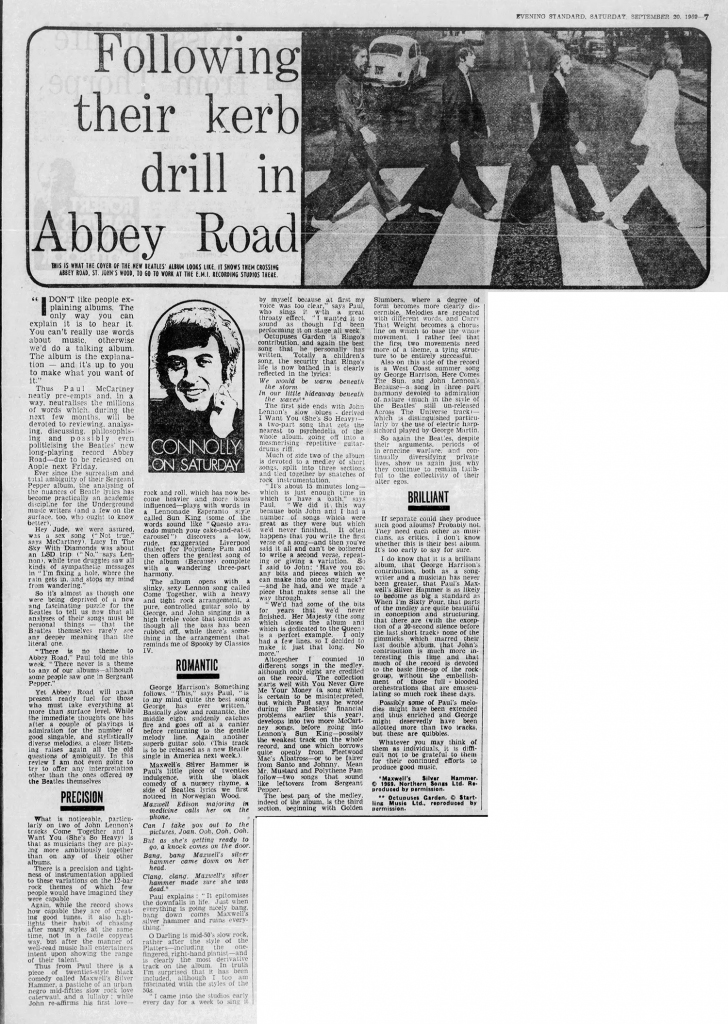Saturday, September 20, 1969
Interview for Evening Standard
Following their kerb drill in Abbey Road
Press interview • Interview of Paul McCartney
Last updated on April 28, 2022
Saturday, September 20, 1969
Press interview • Interview of Paul McCartney
Last updated on April 28, 2022
Previous interview May 16, 1969 • Interview for BBC Radio Merseyside
Article Sep 20, 1969 • John Lennon tells the other Beatles he's leaving the band
Article Sep 20, 1969 • US radio WKBW broadcasts the "Get Back" LP
Interview Sep 20, 1969 • Paul McCartney interview for Evening Standard
Interview Sep 21, 1969 • Paul McCartney interview for BBC Radio 1
Article Sep 25, 1969 • Paul and Linda McCartney at the UK premiere of "Midnight Cowboy"
AlbumThis interview was made to promote the "Abbey Road" LP.
This interview remains the property of the respective copyright owner, and no implication of ownership by us is intended or should be inferred. Any copyright owner who wants something removed should contact us and we will do so immediately.
‘I don’t like people explaining albums. The only way you can explain it is to hear it. You can’t really use words about music, otherwise we’d do a talking album. The album is the explanation and it’s up to you to make what you want of it.’
Thus, Paul McCartney pre-empts and neutralises the millions of words which, during the next few months, will be devoted to reviewing, analysing, discussing, and philosophising on Abbey Road, the Beatles new album which is due to be released next Friday.
Ever since the surrealism and ambiguity of Sergeant Pepper, analysing the nuances of Beatle lyrics has become practically an academic discipline for Underground music writers, and a few on the surface, too, who ought to know better.
Hey Jude, we were assured, was a sex song (‘Not true,’ says McCartney), Lucy In The Sky With Diamonds was about an LSD trip (‘No,’ says Lennon), while druggies saw all kinds of messages in ‘I’m fixing a hole, where the rain gets in, and stops my mind from wandering’.
So it’s almost as though we are being deprived of a new and fascinating puzzle for the Beatles to tell us now that all analyses of their songs must be personal things, that the Beatles themselves rarely see any deeper meaning than the literal one.
‘There is no theme to Abbey Road,’ Paul told me this week. ‘There never is a theme to any of our albums, although some people saw one in Sergeant Pepper.’
The new album opens with a slinky, sexy Lennon song called Come Together, with a tight rock arrangement, and John singing in a high treble voice. George Harrison’s Something follows. ‘This,’ says Paul, ‘is to my mind the best song George has ever written.’ Basically, slow and romantic, the middle eight suddenly catches fire and goes off at a canter before returning to the gentle melody line.
Maxwell’s Silver Hammer is next. ‘It epitomises the downfalls in life. Just when everything is going nicely, bang, bang, along comes Maxwell’s silver hammer and ruins everything,’ is Paul’s explanation.
O Darling is rather after the style of the Platters. ‘I came into the studios early every day for a week to sing it by myself because at first my voice was too clear,’ he explains. ‘I wanted it to sound as though I’d been performing it on the road all week.’
Octopuses Garden is Ringo’s contribution, while the first side ends with John’s I Want You (She’s So Heavy), a two-part song that goes off into a repetitive guitar-drums riff.
Much of side two is devoted to a medley of short songs, split into three sections and tied together by snatches of rock instrumentation. ‘It’s about 15 minutes long, which is just enough time in which to have a bath,’ says Paul. ‘We did it this way because both John and I had a number of songs which were great as they were, but which we’d never finished. It often happens that you write the first verse of a song and then you’ve said it all and can’t be bothered to write a second verse, repeating or giving a variation. So, I asked John if he had any bits and pieces which they could make into one long track? He had, and we made a piece that makes sense all the way through.
‘We’d had some of the bits for years that we’d never finished. Her Majesty is a perfect example. I only had a few lines, so I decided to make it just that long. No more.’
Altogether I counted 10 different songs in the medley, although only eight are credited on the record. The medley starts well with You Never Give Me Your Money (a song Paul says he wrote during the Beatles’ financial problems earlier this year), develops into two more McCartney songs, before going into Lennon’s Sun King. His Mean Mr. Mustard and Polythene Pam follow.
The best part of the medley is the third section, beginning with Golden Slumbers, where a degree of form becomes more discernible. Melodies are repeated with different words, and Carry That Weight becomes a chorus line on which to base the whole movement.
If the Beatles split up, could they produce such good albums? Probably not. They need each other as musicians, editors and critics.



Notice any inaccuracies on this page? Have additional insights or ideas for new content? Or just want to share your thoughts? We value your feedback! Please use the form below to get in touch with us.